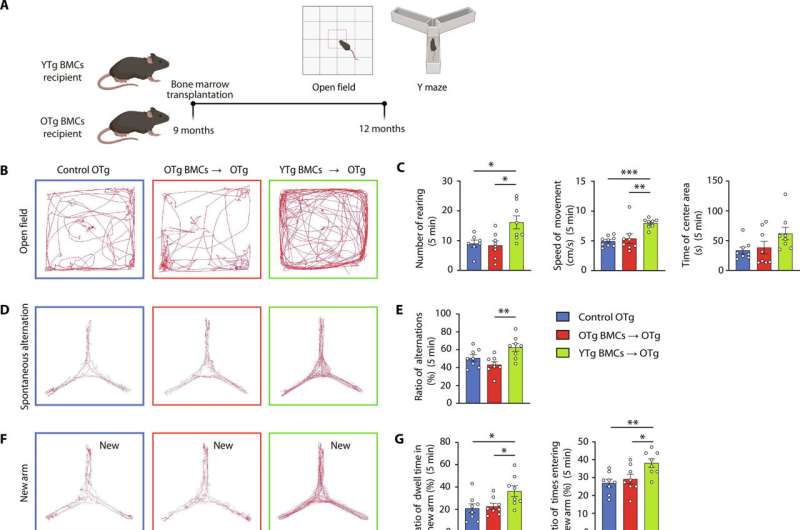Young BMT rescued the cognitive impairment of APP/PS1 mice. Credit: Science Advances (2024). DOI: 10.1126/sciadv.adl1123
A team of neurologists at Third Military Medical University, in China, has found that transplanting stem cells from the bone marrow of young mice into older mice led to a slowdown of the development of Alzheimer's disease.
In their study, published in the journal Science Advances, the group transplanted stem cells from the bone marrow of young mice and into the bone marrow of aged Alzheimer's mouse models and then monitored them to observe differences in their prognosis.
Alzheimer's is a progressive neurodegenerative disease that reduces brain function and ability over time. It is incurable, though many therapies can slow its progression and treat its symptoms.
In this new effort, the researchers noted that some prior research has shown a connection between the robustness of the immune system and the development of Alzheimer's disease, and that the immune system can be revitalized by transplanting juvenile hematopoietic stem cells programmed to differentiate into peripheral immune cells. That led them to wonder if such transplants might slow the progression of Alzheimer's disease.
To find out, they removed hematopoietic stem cells from several young (two-month-old) mice, and injected them into the bone marrow of several older (nine-month-old) mice that had been bred to express Alzheimer's-type symptoms.
In monitoring the mice that had received the injections, the researchers found a drop in amyloid β in both their brains and plasma. They also noted decreases in cerebral plaque and improvements in their cognitive abilities. Mice in a control group who received similar transplants from older mice experienced no improvements.
The research team also found that genes associated with expression of proteins in Alzheimer's mouse models were downgraded, suggesting that the factors leading to the disease were also slowed. Their work suggests that such transplants may prove to be an effective therapy for treatment of Alzheimer's disease in humans.
More information: Pu-Yang Sun et al, Rejuvenation of peripheral immune cells attenuates Alzheimer's disease-like pathologies and behavioral deficits in a mouse model, Science Advances (2024). DOI: 10.1126/sciadv.adl1123
Journal information: Science Advances
© 2024 Science X Network
























